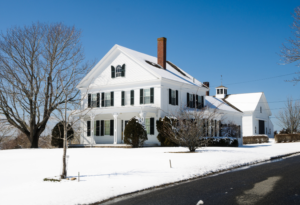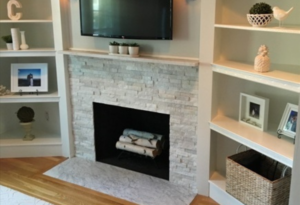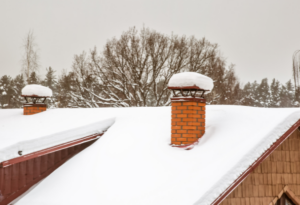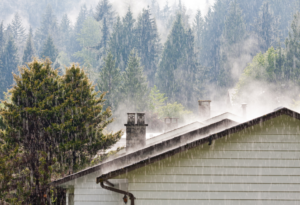Choosing Your Perfect Fireplace: A Guide to Finding Your Ideal Hearth
During the chilly Hartford winters, few things are more soothing than curling up with a good book, a cup of hot chocolate (with those cute mini marshmallows), and the fresh scent of a crackling wood-burning fire. So, whether you want to replace an old, outdated, and inefficient fireplace or install a new heating appliance in a home without a chimney, this handy guide will illuminate the way to finding your ideal hearth.
 Types of Fireplaces
Types of Fireplaces
With so many fireplaces to choose from, you may feel like being stuck in a spinning snow globe. To simplify it, we break it into four distinct categories, each with advantages and disadvantages.
Wood-burning
This classic option delivers a traditional wood-burning experience and subtle warmth. However, it requires effort, such as buying and storing firewood and cleaning ashes. I enjoy visiting local farms to purchase a seasoned mix of hardwoods. There are several farms near West Hartford, and some of them even deliver. If wood-burning fireplaces differ from your preference, a gas or pellet appliance may be a better option.
Gas
Nothing is more convenient than flicking a switch with instant warmth filling the room. There is no mess, no fuss, just flickering flames. Plus, it provides continuous heat, just like a furnace. However, gas hookups and installation costs can be higher, and the natural scent of wood might be missed. Propane is also an option for those without a natural gas line.
Pellet
A pellet fireplace is an eco-friendly alternative to wood. It burns pellets of compressed sawdust instead of wood logs, which produces less smoke, creosote, and ash. Although they require refilling hoppers, a bag of pellets can burn for hours. Plus, their higher efficiency and lower emissions make them a popular choice among Connecticut homeowners who want the classic ambiance of a wood fire without the upkeep.
Electric
For homes without chimneys, electric fireplaces offer a safe and easy solution. While they lack the charm of an authentic flame experience, they provide realistic visuals and supplemental heat, making them ideal for smaller spaces or occasional use.
Finding the Perfect Placement for Your Ideal Hearth
Living Room
Installing your fireplace in the living room creates a natural gathering spot. Consider traffic flow and furniture arrangement to ensure everyone enjoys the warmth.
Bedroom
Imagine falling asleep to the natural sounds of a crackling fire. Installing a fireplace insert in the bedroom offers a romantic ambiance and supplemental heat but ensures there is proper ventilation and addresses fire safety measures.
Basement/Den
Transform your basement or den into a warm, cozy retreat. Basements often have existing venting, making them ideal for wood or gas fireplaces. Dens benefit from the added warmth and visual appeal.
Vented Vs. Ventless Fireplace Inserts
Vented Fireplace Inserts
Vented inserts provide optimal efficiency, air quality, and fuel versatility, making them ideal for primary heating or replacing aging fireplaces. They include a vent pipe that uses the existing chimney, so modifications aren’t necessary in most cases.

Ventless Fireplace Inserts
Ventless fireplace inserts are perfect for homes that lack a chimney. Unlike vented fireplaces, these models don’t require flues. Instead, they release exhaust directly into the room. As a result, they produce less heat than vented fireplaces. Additionally, ventless models have a sensor that automatically turns off the unit to avoid a loss of oxygen.
Fireplaces in Hartford & Central Connecticut
Northeastern Chimney LLC is your premier CSIA-certified provider of fireplaces and stoves, including installations, upgrades, and repairs in Bloomfield, Canton, West Simsbury, and surrounding central Connecticut townships. Call (860) 233-5770 or contact us online to consult with a Certified Chimney Sweep®.
The post Choosing Your Perfect Fireplace: A Guide to Finding Your Ideal Hearth appeared first on .
This post first appeared on https://www.mychimney.com











